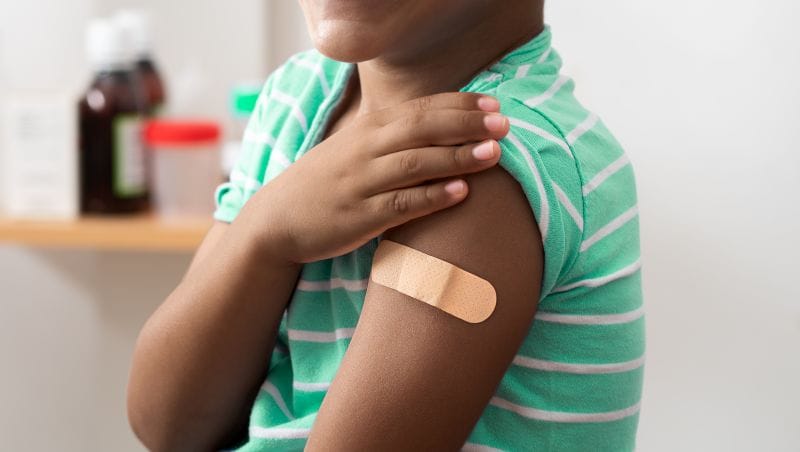The Not-So-Scary Facts About the Flu Vaccine
Halloween costume ordered? Check.
Candy purchased? Check.
Pumpkins carved? Check.
Flu shot scheduled? Wait…flu shot?
That’s what Dr. Marcy Solomon Baker, pediatric medical director for BayCare Medical Group, advises parents: By Halloween, make sure you’ve got your flu shot. Why? Because it takes about two weeks for the flu shot to become fully effective, and the shot confers immunity for about six months. Getting it by the end of October should cover early outbreaks and take you through the travel-heavy holidays and well through the normal flu season, which hits around January or February.
Many parents still resist getting the flu shot for their families, arguing that they are ineffective, unnecessary and that they prevent children from developing natural immunity. Baker has this response: Last year in the United States, there were 253 pediatric flu deaths, about half of them in perfectly healthy children with no underlying conditions. That’s 253 too many children to die from a vaccine-preventable disease.
Here are some other common myths that Baker busts about the flu vaccine:
I’ve survived the flu already. I don’t need another vaccine.
You as an adult may have been all right, but two of the highest risk categories are children under 2, and then children under 5, as well as everyone at any age with underlying health conditions (such as asthma). Getting at least children under 5 vaccinated can protect your most vulnerable family members. If the adults are also vaccinated, you lower the chances of one of you bringing it home to infect small kids or elderly relatives. The whole household becomes healthier and safer.
The flu shot is ineffective because I took it, and I got the flu anyway.
Here’s how the flu vaccine is developed. There are several different types or strains of influenza, and every year, different versions are prevalent. To decide which ones are most likely to hit us in an upcoming season, scientists in the northern hemisphere study the flu incidence in the southern hemisphere, where they circulate first. Then they make their best guess as to the likelihood of those same strains being prevalent here, and they make a vaccine combining those strains. Therefore, efficacy might vary, but what doesn’t change is that the flu vaccine has consistently been proven to prevent sickness from becoming so severe that hospitalization is required. So yes, if you get the vaccine, you might get the flu anyway, but you’ll recover faster and it’s unlikely that you’ll have to go to the hospital.
I took the flu vaccine, and I got the flu from it!
This is impossible because the flu shot is not a live vaccine. It CANNOT give you the flu. At the most, a small minority of people become a little achy and feverish. The most common side effect is a sore arm. However, if you get your flu shot at the peak of flu season, remember that you are surrounded by the disease, and that your shot takes two weeks to become fully affective. You can get the shot and get the flu that same day. That’s why Baker recommends getting it at the end of October, well before flu season fully kicks in.
The flu vaccine hurts, and it’s a pain to schedule.
You can now take a flu mist instead of a shot, and the mist is equally recommended by doctors. Regarding scheduling, as well as your doctor, many pharmacies also administer flu vaccines. You can also get a prescription from your doctor for the flu mist, pick it up from a pharmacy and go home and administer it yourself.
The flu vaccine is another medical expense that I cannot afford.
Most private insurance companies fully cover flu vaccines, and if yours does not or you don’t have insurance, you can get a $10 flu vaccine from your pediatrician through a government program called Vaccines For Children.
As for now, Baker continues her one-person crusade to get families vaccinated by the end of October. “When you’re thinking, what am I going to be for Halloween, I want you to think, ‘Did I get my flu shot?’ When you think, ‘When am I going to buy my candy,’ think: ‘Did we get our flu shot?’ They are safe. They are not new. And the benefits far outweigh the risks.”
And when in doubt? Get the facts from your pediatrician or the American Academy of Pediatrics—not from social media or by crowdsourcing.
“Nobody’s against natural immunity, but you’ve got to make it through,” says Baker, who reminds parents that taking care of sick children who are missing school when you yourself are severely ill with the flu is no picnic either. “Is not getting a flu shot for your child worth the risk? To me, it’s not. I can’t imagine being a parent whose pediatrician recommends a flu vaccine, and I say no, and god forbid, my child dies of the flu. That’s the worst thing I can imagine.”
Presented by BayCare Medical Group
More from BayCare Medical:


